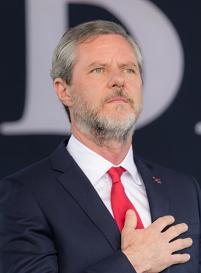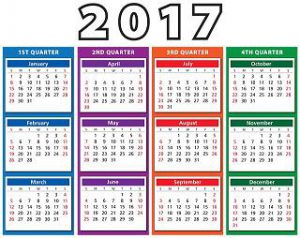This is mark Joseph “young” blog entry #224, on the subject of Religious Politics.
There’s something of a flap at the moment in the world where religion and politics intersect. It seems that Jerry Falwell, Jr. (pictured), has made the comment that Jesus and the New Testament church never tried to tell the government how to run the world, they just focused on saving souls. The inference drawn (I will not claim to know his intent) is that people should keep their religion out of their politics. It’s a bit ironic, really, since Falwell’s father was co-founder, with Cal Thomas, of the organization calling itself The Moral Majority (which some argued was not actually either, but that’s not the point here), which particularly in the 1970s attempted with some success to exert influence to bring the political sphere in line with what it perceived as Christian ideals.
Certainly there is an important principle in American government that religious institutions should be isolated from government, unregulated and unimpeded by each other, uninvolved in each other. However, the notion that religion should not influence government suffers from two major misunderstandings.

The first is simple, but apparently not obvious: politics and religion are, at the core, the same thing. They are both about how you believe the world actually is, and what the best way to live within it would be. They are both fundamentally non-rational, that is, what we might call super-rational, structures of beliefs based on what have been called “pillars” of “moral intuition”. We hold political positions because we believe that certain principles are “right”, whether caring for the needs of the downtrodden and persecuted, defending the freedoms of individuals, or arranging for an equitable outcome in the economic world. Jonathan Haidt does an excellent job of explaining these moral concepts in his book The Righteous Mind: Why Good People are Divided by Politics and Religion (which I review and discuss here). Both are protected by the First Amendment to the United States Constitution, as part of really one fundamental right: the right to believe what you do, express and promote those beliefs, and associate with others to discuss them. You can’t separate politics from religion because politics is religion.
Atheists reject that notion, so we should probably consider it further. If you were an Odinite who believed that Father Odin created the Aryan people to dominate the world before entering the afterlife and using their practiced combat prowess to defend Gladsheim against the giants at Ragnarok, you would promote the position that the government should create opportunities for young men to learn to fight and conquer other countries. If you are a Hindu believing in the transmigration of souls, you are going to work to defend not only the lives of people everywhere but a peaceful coexistence with animal life from cattle to cockroaches. These are not at that point irrational actions or decisions; they are perfectly rational choices based on an embraced understanding of the fundamental nature of the world. Atheists believe there is no god, but in the main they believe that there are binding moral principles, that some things are right and others wrong, and that government ought to promote right conduct and discourage wrong conduct. That is not different from religious belief. It is still about how we understand the world and what we think should happen in it.
So if politics and religion are really fundamentally two different words for what people believe about reality, it becomes inherently impossible for a person to separate the two. If you think separating politics from religion is simple, you fail to understand what they are.
The other flaw in the reasoning that Christianity should not try to manipulate government because it did not attempt to do so in the first century is that this is not the first century and we are not living in the Roman Empire. Most of us are living in republics of one sort or another, nations in which democratic principles choose the goverment and determine the laws.
In Rome, Caesar was the government. In America, we are.
Sure, I’m not Donald Trump or Barrack Obama; I’m not the Speaker of the House or the Senate President or the Chief Justice of the Supreme Court. I’m not even the mayor of my small town (and having known the son of the mayor of a small town, it is not a job I want). However, whether or not I voted for them, whether or not I voted at all, those people hold those offices because we chose them, and that means I by my contribution for or against am partly responsible for that choice. I am the government; you are the government. We have the responsibility to govern ourselves, and to govern each other.
We don’t agree how to do that. That’s par for the course–when did you ever agree with anyone about everything? But we discuss our options, give our preferences, and in doing so we bring our values–our politically and religiously based values–into the decision-making process.My political science professors at Evangelical Christian Gordon College years ago made the point that it did not matter whether or not a candidate for office was a Christian, in the sense of claiming a Christian faith or being a member of a recognized Christian church. What mattered was whether a candidate stood for political principles consistent with the Christian faith and a Christian view of how to govern. The person himself could be Jewish, or Muslim, or Hindu, or even Atheist. He could have a deplorable private life, and be selfish and cruel in his personal relationships. What matters ultimately is that what drives his choices in governing is principles supporting a more Christian world, and whether he is politically effective, capable of leading.
I’m not in the least bit interested in discussing whether our current leaders are such people. We could spend years just trying to come to some kind of agreement concerning what Christian principles of government are, and how to balance things like equity and kindness and freedom. I am only saying that religious people are inherently going to bring their religiously-based views about reality, their political views, into these discussions, and that’s part of the democratic political process. You can’t keep religion out of politics without keeping values out of politics, and once you remove values from politics you have nothing left.




